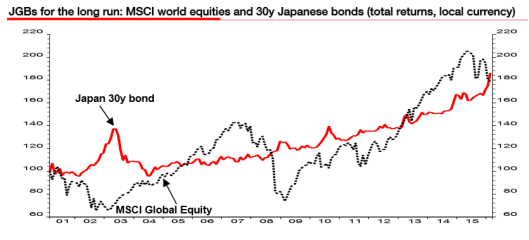I wish I could take credit for the the title of this post “The Stupid is Not Impossible” but it comes via an email from Albert Edwards at Society General. In turn, Edwards credits Breaking Views columnist Andrew Lapthorne.
In his post, Edwards comments that Japanese bonds are the only asset class to not suffer a decline since 2007. That analysis is deeply flawed since it does not factor in the decline of the Yen.
Yet, the bulk of Edwards’ post I agree with.
The title of Edwards email was “Forget Equities. Forget Smart Beta. Buy JGBs for the long run!” Edwards provided this chart.

The problem with the chart is it’s in “local currency”, the Yen. At these interest rates, yen-hedged, such advice will yield absolutely nothing.
Buying Japanese bond now is a strict endorsement of buying the Yen. That’s not a recommendation I am willing to make.
Let’s move along to things in Edwards’ report I agree with. From Edwards ….
I commend a recent article by Edward Chancellor, now at Breaking Views. He writes “the markets appear to have woken up to the fact that this radical monetary trick fails to deliver on any of its promised benefits. On the contrary, negative rates undermine bank profitability, threaten the stability of bank liabilities, force households to save more, and discourage credit creation. If carried further, negative rates may threaten an unwarranted intrusion of the state into the private lives of its citizens. It’s time for politicians to try rein in their overzealous central bankers and kill this dangerous policy before it wreaks more damage.”…”It’s not just that the theoretical case for negative rates is flawed. Europe’s recent experiment with them shows some worrying developments. Independent economist Andrew Hunt argues that “negative rates are exceptionally toxic to any country’s banking system,” as they hurt bank profitability. Negative rates also appear to be contributing to the flight of long-term deposits from Germany’s banking system. When banks can’t attract long-dated liabilities to match assets of a similar duration, the financial system becomes less stable. “What is bad for banks is bad for credit growth,” says Hunt. Since Swiss rates turned negative, the country’s credit growth has halved.”
But as Andrew Lapthorne pointed out to me, “The Stupid is Not Impossible”. I believe that the next recession will bring deeply negative rates, however damaging it might be to bank profits, and I see central banks implementing restrictions for holding cash. And as Vincent Chaigneau, SG’s head of bond strategy, pointed out to me a few days ago when the US 10y Note was 1.68%, If in one year that same note (then a 9y) trades at minus 0.32% (down 200bp) then the T-Note will have delivered a total return of 19%. Not bad indeed.












Leave A Comment